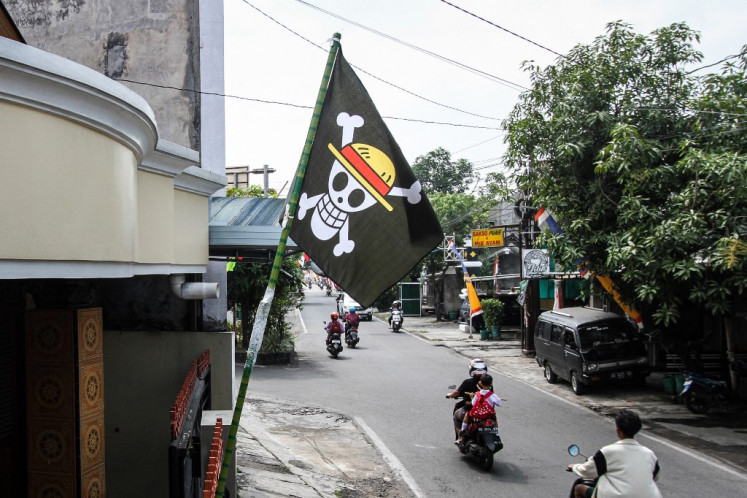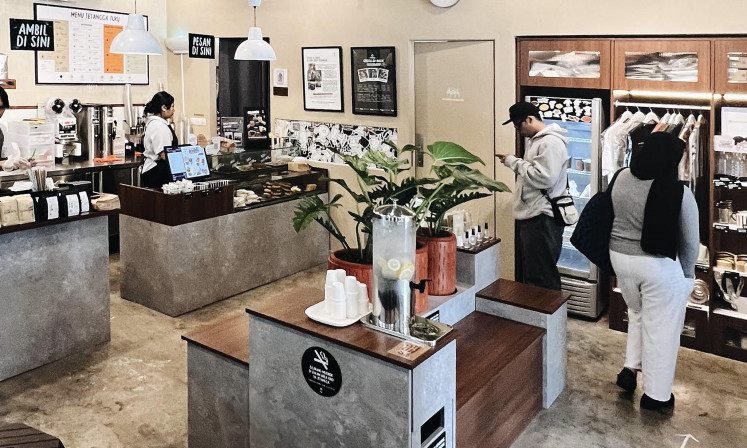Popular Reads
Top Results
Can't find what you're looking for?
View all search resultsPopular Reads
Top Results
Can't find what you're looking for?
View all search resultsGrass roots activists hope to make laws, not battle them
For many grass roots activists, democracy begins on the street, but years of experience have convinced some that the best place to ensure a change is at the House of Representatives
Change text size
Gift Premium Articles
to Anyone
F
or many grass roots activists, democracy begins on the street, but years of experience have convinced some that the best place to ensure a change is at the House of Representatives.
'I felt frustrated when I couldn't gain support from local authorities for environmental reclamation and community empowerment activities on Nusa Kambangan Island, Central Java,' a legislative candidate for the Indonesian Democratic Party of Struggle (PDI-P) Sri Utami recently told The Jakarta Post.
The 31-year-old Utami said she needed to find another way to empower poor people and improve their environment. During her decades as a communications consultant for various socially concerned NGOs, Utami began to realize that not much could be accomplished within existing legal frameworks.
'Most of the obstacles I encountered came from policies that failed to accommodate the needs of the poor. A seat in the House would help me to build a bridge between the people and the policy makers,' she said.
Utami first became acquainted with politics when she was a student at Jenderal Soedirman University (Unsoed) in Purwokerto, Central Java, where the PDI-P had a student volunteer organization. After graduating, she went to work as a community development consultant for local and international NGOs, including the United Nations Development Program (UNDP) Indonesia, but kept in touch with her school PDI-P friends.
In 2013, one of her former schoolmates suggested she might find a better path to change in politics. So, she left her position at UNDP Indonesia to register as a legislative candidate for the PDI-P.
She said Megawati Soekarnoputri had influenced her, as a woman, to enter a political movement to push for social change. She is now running for a seat in the House as a candidate representing Central Java.
Aliza Gunado, who is running as a legislative candidate for the Golkar Party, plans to bring his passion for community empowerment into the lawmaking forum for the benefit of the public. 'I want to get involved directly in the process of government decision making so that regulations will be pro-people,' he said.
The 33-year old from Lampung said he liked to travel from one city to another in Indonesia to meet with local community organizations, including the Lampung Poor Union.
He has also created youth communities, such as the environmental group +RECKLESS, in Makassar, South Sulawesi, and the art and culture preservation organization, LEMPENG NIDYA, in Jakarta.
'However, one day I asked myself how I could change the system if I wasn't inside it?' he said.
Around that time, he met Basmin Matayyang, a senior politician from South Sulawesi, who suggested that politics might be the answer.
Sarbini, a political activist whose career has spanned membership in the Jakarta Student Senate Communication Forum as an activist and a stint as a special assistant to a member of the Jakarta Representatives Council (DPD Jakarta), said these experiences made him realize how important political parties were in terms of creating sustainable democracy in Indonesia.
'Political parties need support to develop democracy in Indonesia. Social activists like me can help parties function properly as agents of reform and change,' he said.
Sarbini said he looked around to try to determine which parties were less corrupt. It turned out that the People's Conscience Party (Hanura), a party often associated with human rights violations because its chairman, Gen. (ret.) Wiranto, was military commander during the 1998 riots, was one of the cleanest parties, he said.
He decided to join Hanura after discussing with his activist friends, who had already become Hanura members. His friend introduced Sarbini to Wiranto.
'I heard what had happened from Wiranto's perspective,' he said.
Sarbini said if he were elected to the House as a Hanura legislator, he would urge the government to set up a tribunal to investigate and prosecute anyone suspected of human rights violations. (tam)










